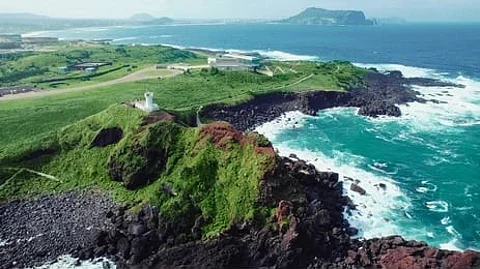
- Destinations
- Experiences
- Stay
- What's new
- Celebrating People
- Responsible Tourism
- CampaignsCampaigns
- SubscribeSubscribe
- Buy Now

Tourists around the world face growing criticism for damaging cultural sites and disrupting local life. Examples include a couple breaking a Swarovski chair in Verona and a visitor defacing a painting at the Uffizi Gallery in Florence. In Italy, a woman carved her initials into the Leaning Tower of Pisa. To combat overtourism’s harmful effects—like environmental damage and strained infrastructure—countries are enforcing stricter rules such as fines and visitor limits. These measures protect heritage and communities while encouraging responsible travel. Now, South Korea’s Jjeu Island is trying a new approach to remind visitors to behave respectfully.
Facing a rise in unruly tourist behaviour, Jeju Island has introduced South Korea’s first multilingual etiquette notice to promote order on the popular resort. The Jeju Provincial Police printed 8,000 notices in Korean, English, and Chinese to help bridge cultural differences and inform foreign visitors about local laws and customs.
The notices warn against minor offences such as jaywalking, littering, smoking in prohibited areas, and public drunkenness, urging tourists to cooperate in maintaining public order. This initiative comes after increased complaints from residents during peak season, with repeat offenders facing possible fines to ensure respectful behaviour.
“Officers carry the notices during patrols and hand them out when they encounter minor violations on the spot,” an official at the Jeju Provincial Police Agency told The Korea Times. “Serious offenses are dealt with immediately, but for minor ones we usually issue the notice instead of stricter action.” The official added that this approach helps ease tensions with tourists and reduces officers’ workload.
First-time offenders are generally given a warning, while repeated violations may result in fines of up to 200,000 won (approximately $143). Initially, around 8,000 copies of the etiquette guide are being handed out.
According to reports, Jeju has welcomed over 7 million visitors this year, according to the Jeju Tourism Association. Domestic tourists numbered around 5.86 million, a 9.3% drop from last year, while foreign arrivals rose by 14.2% to over 1.16 million. July saw a particularly sharp increase, with foreign visitors up more than 40% compared to the previous year.
With tourism booming, concerns over public order and tourist behaviour have grown. The Korea Times stated that between March and June, Jeju police launched a special campaign targeting foreign visitor violations, recording over 4,800 cases of disorderly conduct such as jaywalking, littering, and public urination. Viral incidents, including a woman smoking on a bus and a child urinating near a beach bus stop, have intensified complaints from locals.
Jeju Island, just an hour’s flight from Seoul, has a unique mix of volcanic landscapes and beaches. Designated a special autonomous region by South Korea's government in 2006, Jeju has also eased visa rules to boost international tourism. Formed by volcanic eruptions over a million years ago, Jeju is a UNESCO-recognised natural wonder, famous for its lava tubes, caves, waterfalls, and pristine white-sand beaches. Hallasan, South Korea’s highest mountain, dominates the island and offers a rewarding day hike to its crater lake.
Jeju Island is renowned for its legendary "Haenyeo," or sea women, who have dived for generations to gather seafood without the use of oxygen tanks. These skilled divers share a profound bond with the ocean and have fostered a unique semi-matriarchal culture that emphasises ecological sustainability. Although their numbers are dwindling as fewer young people continue this challenging tradition, the Haenyeo remain a powerful cultural symbol and an enduring emblem of Jeju’s heritage and identity.
Jeju Island is celebrated by UNESCO for its outstanding natural and cultural importance. It is the first place in the world to receive UNESCO’s prestigious triple recognition in natural science: designated as a Biosphere Reserve in 2002, a World Natural Heritage Site in 2007 for its volcanic features including Mount Hallasan, and a Global Geopark in 2010. In addition, the island’s distinctive Haenyeo women divers were added to UNESCO’s List of Intangible Cultural Heritage in 2016, highlighting the cultural richness alongside its natural wonders.
Countries such as Italy, Spain, Portugal, Indonesia, Japan, and South Korea are increasingly clamping down on bad tourist behaviour through new fines, restrictions, and public awareness campaigns aimed at tackling overtourism and protecting local culture and the environment. In Italy, particularly in Venice and Portofino, authorities have introduced hefty fines for actions like swimming in canals, eating near monuments, littering, and wearing swimwear outside designated beach areas.
Similarly, Spain’s Balearic Islands impose fines for public drinking and inappropriate dress, while Portugal’s Albufeira enforces penalties of up to €1,500 for wearing swimwear away from the beach. Bali has launched a public campaign and even created a hotline to report misconduct, with plans to ban tourists from renting motorbikes to curb unruly behaviour.
In Japan, officials are tackling issues such as tourists disrespecting sacred sites, posing with geishas, and damaging temples. Meanwhile, Amsterdam is cracking down on disorderly conduct and public urination as part of efforts to move away from its party-centric reputation.
